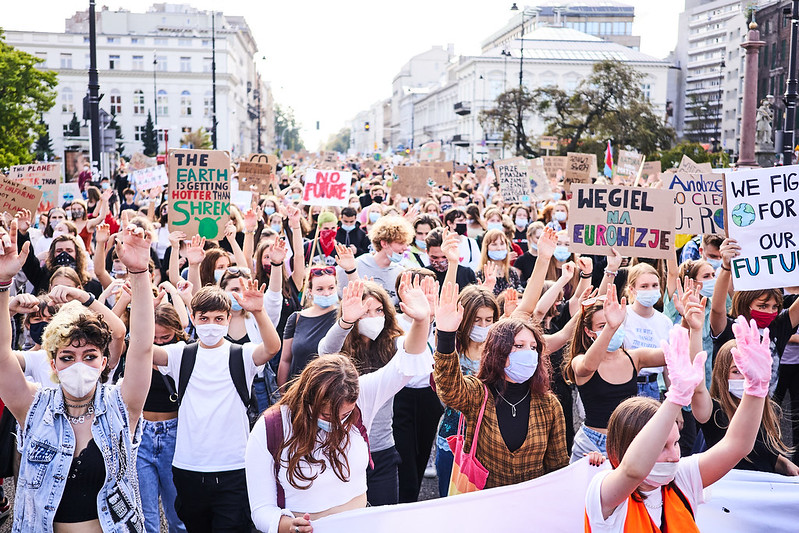
For the first time since the coronavirus pandemic hit Europe, thousands of protesters are once again taking to the streets and social media, from Brussels to Moscow, to call on governments to step up climate action. This new wave of demonstrations, labelled the Climate Care Uprising, is taking place just as governments and the European Union are making decisions that could turn the tide in the fight against climate breakdown.
In Germany, the country holding the rotating presidency of the EU, activists recently opposed coal expansion near Düsseldorf, while 30 protests took place in Poland alone. On Wednesday (30 September), protesters confronted European environment ministers in Berlin, as they met to discuss the European Union’s climate action.
As a major global polluter, with a legacy of colonialism, and the largest economy in the world, European governments have a responsibility, as well as the resources, to tackle the problems we face. Europe’s history of environmental extraction has seen natural resources exploited across the planet, exacerbating the impact of climate breakdown in the Global South.
As Europe and the world respond to the Covid-19 pandemic, politicians have a chance to build a fairer, greener world, but they continue to be held back by big polluters. Only people power can break the destructive bond between politicians and the powerful corporations that are most responsible for the climate crisis.
Next Tuesday 6 October, the European Parliament will vote on new climate measures and a target to accelerate emission cuts in the EU by 2030. The results of this vote could have far-reaching consequences for people and the planet. UN science suggests that we need to cut emissions by at the very least 65% by 2030, compared to 1990 levels. But without major public pressure, the Parliament is unlikely to support a target beyond 60%. Anything below 65% would be bad news indeed.
The European Commission is even further away from science. It only backs a target of at least 55% emission reductions by 2030 – but this includes emissions absorbed by forests and soil, limiting the requirement for emission cuts in polluting sectors like energy, transport and farming.
Ultimately, the EU Parliament and European governments will have to come to an agreement about how far the EU will go and whether it abides by its commitments under the Paris climate agreement to limit global heating to 1.5°C. Crossing this threshold would unlock a spiralling climate crisis.
European government leaders will meet at a summit in Brussels on 15 and 16 October, where they will respond to the Commission’s climate plans and the vote in the European Parliament. They will also thrash out how to spend an unprecedented stimulus package and EU budget to help Europe recover from the impact of coronavirus.
The problem is that despite the talk of a green deal and a green recovery, Europe is falling behind science and is losing its climate leadership. Those demonstrating across 91 events in 26 countries over the coming days are sick of greenwashing and want to see solutions that meet the severity of the crises we face.
Only a week ago, China announced for the first time that it would achieve carbon neutrality before 2060, slashing emissions to almost zero and ensuring the small amount that’s left can be absorbed by forests and other means. Clearly this is not enough, but it shows that Europe can no longer pretend it’s acting alone.
Georgia Whitaker, Lead Campaigner Greenpeace EU Climate Campaign
—
Greenpeace EU press desk: +32 (0)2 274 1911, [email protected]
For breaking news and comment on EU affairs: www.twitter.com/GreenpeaceEU
Greenpeace is an independent global campaigning organisation that acts to change attitudes and behaviour, to protect and conserve the environment and to promote peace. Greenpeace does not accept donations from governments, the EU, businesses or political parties.
